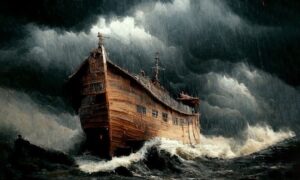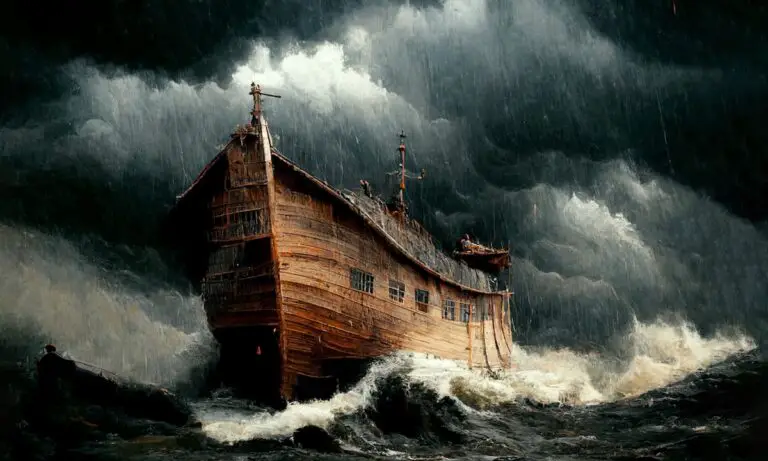The Proof That the Flood Really Happened
Whether you grow up in the church or outside of the church, you have likely heard the story of the flood. While this is a familiar Bible story, it’s important to understand that the flood of Noah is more than just a story. The Bible gives us accounts of this event in Genesis 6-9 and reveals God’s purpose for the flood.
So, did the flood really happen or is it just a parable of sorts? Several pieces of evidence in the Bible point to a literal flood, providing proof of its occurrence. Some of the proof of the flood comes from direct accounts in the Bible.
Genesis 7:24 says, “The waters flooded the earth for 150 days” and “all of the high mountains under the entire heavens were covered” (Genesis 7:19).
Additionally, Genesis 6:7 states that God “regretted that he had made human beings on the earth”. These are just some of the passages in scripture that provide direct evidence of a real flood.
In this blog post, we will take a closer look at the account of the flood according to the Bible. We will consider what the Bible says about God’s purpose for the flood and discuss physical evidence that can be used to support it. By examining this topic, we can gain a better understanding of the flood and its significance to our faith.

What Was the Flood in the Bible?
The flood in the Bible was a catastrophic event that lasted 150 days and covered the entire surface of the earth. God explained his purpose for sending the flood in Genesis 6:7, “I will wipe human beings I have created from the face of the earth – people together with animals and creeping things and birds of the air, for I am sorry that I have made them” (NIV).
God chose to spare Noah and his family by having him build an ark. After they were safely on board, God closed up the ark’s door (Genesis 7:13-16). Then he unleashed a flood upon the land that swept away all living creatures – except those inside Noah’s vessel.
God’s Purpose for the Flood
The Bible provides several clues about God’s purpose for the flood. In Genesis 6:5-7, God speaks of his grief over mankind’s wickedness and violence. He also states that he is sorry that he made them. This passage implies that God judged the world with a flood in response to their evil deeds.
God’s words after the flood tell us the same thing. According to Genesis 8:21, “The Lord said in his heart, ‘Never again will I curse the ground because of human beings…” (NIV). Even though mankind had sinned greatly, it appears that God chose to forgive them and start fresh after the destruction of the flood waters.
What Happened After the Flood?
After the flood waters receded, Noah and his family left the ark. God then made a covenant with them and promised never to bring a catastrophic flood upon the earth again (Genesis 9:11).
He also provided instructions on how they should live in light of this new covenant – including not eating blood or taking life unjustly (Genesis 9:1-7). This served as an example for us as followers of Christ to honor God’s laws and live righteous lives.
Biblical Proof of the Flood
The Bible is rife with references to the great flood and provides ample evidence of its occurrence. As mentioned earlier, God states his purpose for sending the waters in Genesis 6 and 7.
We also find specific details about how long the flood lasted (150 days) and where it covered (all of the high mountains). This is all evidence that this event really did occur as told in scripture.
Additionally, numerous stories around the world tell similar accounts of a great deluge. For example, ancient Mesopotamian texts contain stories that feature a character named Utnapishtim who built an ark containing pairs of animals to survive a divinely-sent flood.
These cultural stories support the Biblical account of a great flood and provide further proof that this event actually happened.

Physical Proof of the Flood
In addition to these biblical and cultural stories, there is physical evidence that the Bible’s account of the flood is true. The Black Sea was once a freshwater lake, but it suddenly changed into a saltwater sea around 5500 BCE due to an influx of water from the Mediterranean Sea.
This could be explained by what geologists call “the Black Sea Deluge Theory” – which suggests that an immense amount of water suddenly flooded into the area, changing its makeup in one fell swoop.
Other evidence for this theory includes sediment layers in the region which have been dated back to around 5500 BCE – when scientists believe the flood occurred. Additionally, fossil remains of ocean life have been found in the region, providing further proof that this was once a saltwater sea.
What Christians Can Learn From the Flood
The Biblical account of the great flood teaches us several important lessons about our faith. First, it shows us that God is both a loving and just God – he desires to bring justice to the world but also offers forgiveness when people turn from their sins.
Second, it reminds us of our own mortality and fragility as human beings in light of God’s immense power. The flood serves as a reminder that we are only here temporarily and will one day face judgment if we do not repent of our sins.
Finally, the story highlights how important it is for us to be ready for anything that might come our way. Noah was prepared for the coming destruction because he followed God’s instructions by building the ark.
In the same way, we should always prepare ourselves to stand firm in our faith and resist any temptation that might come our way.
By studying the account of the flood, we can gain a better understanding of God’s character and plan for our lives. This will help us to be more faithful followers of Christ and live our lives in a way that honors him.
The Flood and Biblical Geneology
The flood also plays a significant role in the biblical genealogy. This is because many of the major patriarchs – such as Abraham, Isaac, Jacob, and Joseph – were born after the flood had occurred.
This has important implications for the faith since it shows us that God remains faithful to his promises even after a great destruction. It reminds us that no matter what happens, we can trust in God’s promises and plan for our lives.
The story of Noah’s Ark serves as an example of how faithfulness and obedience to God will be rewarded. Even though the world was filled with wickedness, Noah still followed God’s instructions by building the ark and thus saved himself and his family from certain destruction.
This provides us with an important reminder that even in times of darkness and despair, God can still work wonders if we are willing to trust Him and obey His commands.

In Conclusion
In conclusion, the evidence for a great flood that took place in Biblical times is quite compelling. The Bible provides clear details about God’s purpose for the event and stories from other cultures support it.
Additionally, physical evidence from near the Black Sea supports one potential source of water for this massive deluge. Whether or not you believe in this account of history, it is certainly interesting to consider!
By examining this topic, we can gain a better understanding of the flood and its significance to our faith as Christians.
We now have an abundance of information on the story of Noah’s Ark, which has been passed down through generations. It is up to each individual person to decide whether or not to believe it.
As Christians, we are thankful for the account of the flood and Noah’s Ark through scripture as we can learn so much about Christ.

